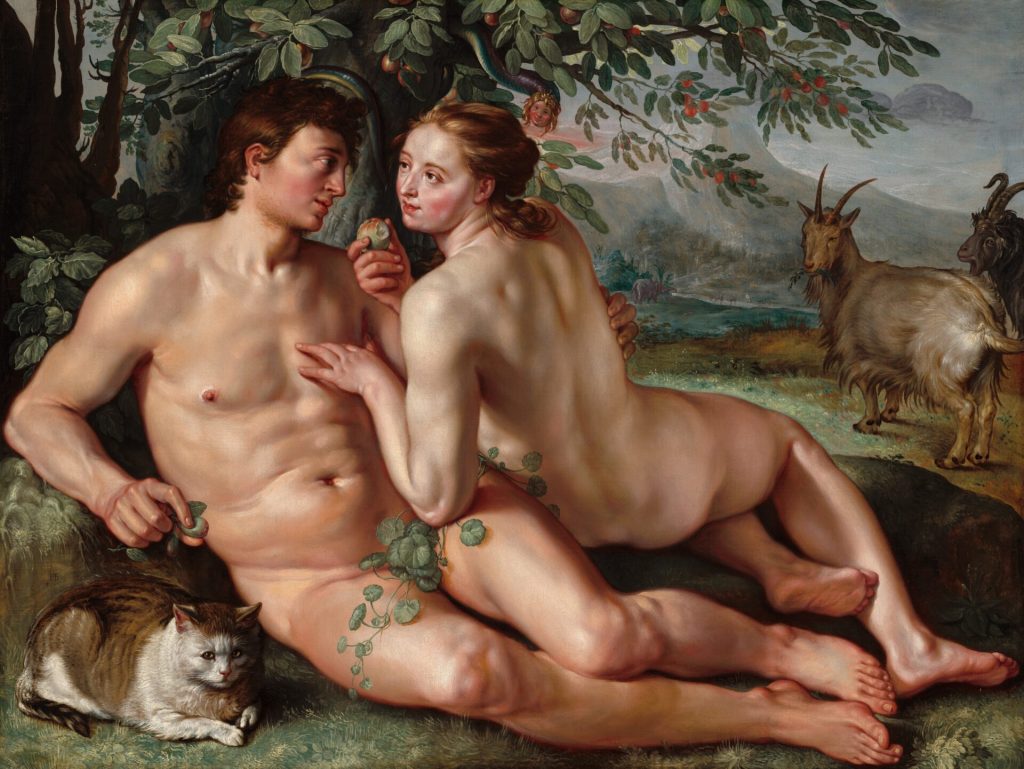In Book IX of Paradise Lost, Satan—through twisted logic and poisonous arguments—convinces Eve to eat the fruit from the Tree of Knowledge, and in so doing, initiates her fall from paradise. Upon eating the apple, she returns to Adam, selfishly asking him to eat from the Tree as well, so he may share her new condition. Adam’s inner monologue—his immediate reflections upon learning of Eve’s betrayal—and conclusions he reaches reveal just how willfully weak Adam is regarding Eve. Adam consciously decides to share Eve’s fate and eat from the Tree with hardly any reflection. His thought process and decision highlight how, unlike Eve, Adam’s weakness is willful, caused by physical passion and blind desire, which overwhelm his reason.
Immediately, Adam and nature recognize Eve’s fall. When she rejoins him after eating the fruit, Adam goes into a state of shock. From his hand, “The garland wreathed for Eve / Down dropped, and all the faded roses shed” (Milton 2007, Book IV Lines 892–893). The wilting of the roses is the first imagery of decay in Eden, signifying nature’s acknowledgment of Eve’s fall. The dropping of the rose crown is reminiscent of the crown of thorns Jesus would later wear, alluding to a similar state of holiness Adam and Eve could have achieved. By dropping the crown, Adam demonstrates his acknowledgment of this loss and draws attention to the decay now occurring in humanity. Adam berates himself, demanding to know of Eve, “How art thou lost, how on a sudden lost” (IV 900). Again, with no sign from Eve, he recognizes the loss that she has undergone. The repeated use of the word “lost” highlights Eve’s fall from God’s grace and highlights Adam’s feelings towards the nature of Eve’s transgression. In his eyes, she has merely “lost” herself, a phrase that lacks acknowledgment of her agency. Through recognizing and initially downplaying Eve’s fall, Adam begins the process of allowing passion to taint his reason, justifying his desire to follow Eve.

Adam’s inner confusion continues as he monologues, revealing the overwhelming nature of his feelings, especially as they relate to Eve. His first thought is about Eve’s physical beauty, addressing her as “fairest of creation, last and best / Of all God’s works” (IV 896–897). This assertion blatantly contradicts what Raphael told him: that Eve is “less excellent, as thou thyself preceiv’st” (VII 566). By ignoring what Raphael has instructed, Adam lets his passion dictate his beliefs, although they are contrary to what he knows is true. He continues to praise her, passion clouding his thinking, causing him to believe what he knows to be untrue. He remembers how “Whatever can to sight or thought be formed, / Holy, divine, good, amiable, or sweet!” (IV 898–899). Again, Adam ignores reality and the situation. Eve was only every human, never “holy” or “divine.” Furthermore, after eating the fruit, Eve has fallen even further from God’s grace. Adam’s repeated mischaracterization of Eve’s spirit shows that his passion for her is so blinding that it overwhelms his reason and causes him to choose to fall.
Finally, after desire has filled his heart and clouded his decisions, Adam disregards God and decides to eat the fruit. Without thinking of anything other than Eve, Adam decides, “And me with thee hath ruined, for with thee / Certain my resolution is to die” (IV 906–907). Adam relinquishes his agency to Eve, following her decision, one in which he had no say. He continues, describing their relationship as one of “flesh of flesh” that cannot be separated (IV 914). Eve being “flesh of flesh” is strictly true as God made Eve from Adam’s rib. However, it also speaks to a newfound bodily need for Eve. This new desire for Eve’s person is what finally connives him that he must fall with Eve, as “from thy state / mine never shall be parted, bliss or woe” (IV 915–916), sealing his fate by echoing the phrasing of Eve just prior to her fall.
When Eve returns to Adam after eating the fruit, he goes through a series of logical steps that lead him to conclude that he must fall. First, he immediately perceives Eve’s loss and downplays her actions. Then he overwhelms himself with falsehoods regarding Eve, growing his desire for her so intense that it completely clouds his judgment. Finally, due to his weakness regarding Eve, he willingly chooses to fall. Adam’s weakness is caused by physical passion and blind desire, ultimately driving his choice to fall.
Works Cited
Milton, John. “Paradise Lost.” In The Complete Poetry and Essential Prose of John Milton, edited by William Kerrigan, John Rumrich, and Stephen M. Fallon, 293-630. New York: Random House, 2007
Leave a Reply